Interior Architecture Master’s Programs
At RISD you can specialize in one of two areas of the broad field of interior architecture, towards a master of design (MDes) degree that readies you for a wide range of professional and creative practices: adaptive reuse, and exhibition and narrative environments.
For those engaged in the adaptive reuse curriculum, you focus on the alteration of existing structures, and gain deep knowledge in the practice of interior interventions, while the MDes in exhibition and narrative environments equips you to create compelling, communicative interior interventions within the framework of museums and other storytelling spaces.
2-year+ MDes program in Adaptive Reuse
The 75-credit Master of Design (MDes) in Interior Studies: Adaptive Reuse program offers a unique design education in the alteration of existing structures through interior interventions and the practice of adaptive reuse. This course of study focuses specifically on designing interventions for existing structures at many scales—from single rooms to entire buildings as well as the larger urban fabric.
While operating outside the confines of professional architectural licensure, graduates of the program qualify to sit for the National Council for Interior Design Qualification (NCIDQ) exam.
MDes: Adaptive Reuse learning outcomes
Graduates of the MDes Adaptive Reuse program are prepared to:
- adopt a clear aesthetic, theoretical and technological framework for interior studies in order to engage in this subject in the design field.
- investigate different aspects of design interventions in the built environment.
- articulate the distinctive nature of interior studies as an effective member of a design team able to interact and collaborate with fellow professionals in related fields.
- develop design strategies that recognize the importance of social and environmental responsibility.
- assess the spatial transformation capabilities of an existing structure.
- formulate an original design concept based on research and evaluate, develop, present and advocate coherent design propositions.
- understand and incorporate related consultant feedback as part of the collaborative process in a professional setting.
2-year+ MDes program in Exhibition and Narrative Environments
In the 75-credit Master of Design (MDes) in Interior Studies: Exhibition and Narrative Environments program, you engage in a dynamic course of study focused on making interior interventions within the context of narrative environments—spaces that encompass or communicate a form of storytelling.
In providing a clear aesthetic, theoretical and technological framework for the study of exhibition design, the program properly equips graduating students to create narrative experiences within museum settings. You may take exhibition-related coursework through electives in other departments, such as Graphic Design, Digital + Media and Theory and History of Art and Design, or through Brown University, and also take advantage of resources and opportunities offered by the RISD Museum.
MDes: Exhibition and Narrative Environments learning outcomes
Graduates of the MDes Exhibition and Narrative Environments program are prepared to:
- engage and formulate a clear aesthetic, theoretical and technological framework for the design of exhibitions and narrative environments and become an active contributor to this emergent multidisciplinary design field.
- investigate different aspects of designing, fabricating, installing and curating exhibitions and narrative environments, understanding and responding to the curatorial content, subject matter and physical context.
- articulate the expertises of various professionals in related fields involved in the shaping of exhibitions and narrative environments in an interdisciplinary and cross-disciplinary context.
- develop design strategies that recognize the impact of cultural and social issues in shaping the experience of a narrative environment in the context of museums, exhibitions and public spaces at large.
- assess design methods for translating content and context into spatial experiences inherent to an exhibit or narrative environment.
- formulate an original design concept based on research and evaluate, develop, present and advocate coherent design propositions.
Graduate student work
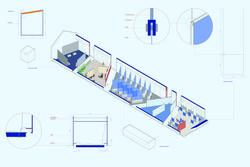
Yujiang Wu MDes 2024
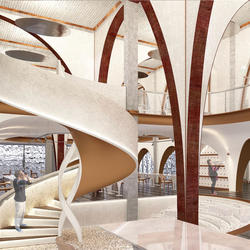
Dongyang Chen MDes 2024
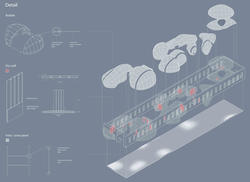
Eunji Park MDes 2024
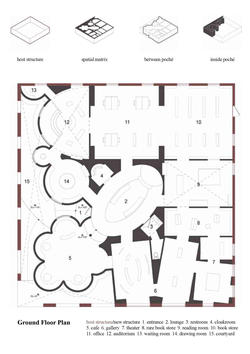
Daeun Kim MDes 2023
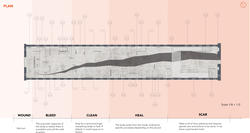
Vivian Natalia Combariza Mejia MDes 2024
Inspiring community
Approximately 100 undergraduate and grad students pursue degrees in the Interior Architecture department, working together in RISD's Center for Integrative Technologies. Students come from around the world and work with more than 25 full- and part-time faculty members who studied and practice in the US and internationally. This lends a very global, cosmopolitan feel to the department and allows for especially fruitful collaborations and critical exchange.
Learning environment
Design studios are at the heart of our Interior Architecture MDes programs, with seminars that let you hone your theoretical and design skills and understanding of relevant technologies.
For students with undergraduate degrees in fields other than architecture, the MDes program provides a unique design education on the alteration of existing structures through interior interventions and adaptive reuse, outside the confines of professional architectural licensure.
Degree project
MDes candidates in Interior Architecture demonstrate competency through self-directed degree projects (DPs) that include a seminar on theory, a research component and a studio component.
Each DP focuses on the transformation of an existing structure of their choice in the city of Providence. All MDes candidates also participate in an annual graduate thesis exhibition of work by students graduating from RISD's advanced degree programs.
Want a closer look? Discover our graduate admissions events.
Hosted each fall by the Admissions team, our in-person and online events give you an excellent intro to RISD graduate programs, life in Providence, how to apply and more.
Application requirements
Application form
Submit your RISD application form, and all other credentials, through the RISD Applicant Portal. The application fee is $60.
Academic transcripts
Initially, you must provide unofficial transcripts of all undergraduate and/or graduate study indicating satisfactory completion, or evidence of anticipated completion, of an undergraduate degree program from an accredited college or university. You can upload your unofficial transcripts to the RISD Applicant Portal.
If your academic credentials are prepared in a language other than English, they must be translated into English by an approved translator before submitting. Enrolling students will later be required to submit official transcripts.
Portfolio
Applicants to graduate studio programs must submit 10–20 examples of visual work, with certain programs providing more specific ideas or portfolio requirements.
Use SlideRoom to submit your graduate portfolio .
Specific program instructions
Digital + Media
Your portfolio should contain 10 samples total, which can be a combination of media (e.g., images, video, sound). You may submit up to five videos as project documentation or excerpts of time-based media. In your portfolio you are encouraged to submit at least one video that clearly demonstrates your research and/or work process. Total runtime for all videos should be no more than five minutes.
Please do not submit multi-page PDF files. Each sample should be accompanied by text identifying the medium and year, as well as a four-sentence description explaining the concepts that inform your work (50 words maximum). If you include collaborative projects, you must clearly identify your individual contribution.
Furniture Design
RISD’s MFA in Furniture Design emphasizes critical making—an approach that integrates conceptual thinking with hands-on material experimentation. Through iterative processes involving tests, models and human-scale objects, students explore the possibilities of form, technique and function. The program encourages engagement with contemporary issues, fostering work that is both materially grounded and culturally responsive. We welcome applicants from all backgrounds, disciplines and creative perspectives.
Portfolios should prioritize resolved 3D work. We recommend avoiding overcrowded layouts, excessive renderings or overly detailed conceptual or technical descriptions.
For those applying to the 2-year track, a high level of resolution is expected in the ability to synthesize and materialize conceptual and creative ideas.
For the 3-year track, we look for candidates who can clearly demonstrate your research and conceptual interests, along with current technical skills and material proficiencies—regardless of how developed those may be at the time of application. The emphasis here is on potential for growth, and we recognize that applicants may be at different stages in your technical development.
In addition to the portfolio, you may submit an optional self-made video (maximum 20 seconds) that captures an aspect of your making process or approach. While professional production quality is not required, the video should offer insight into how you bring an idea to life—whether through a simple or complex project, large or small. This is an opportunity to demonstrate your engagement with the process of making—you are encouraged to interpret this in a way that reflects your individual interests.
Industrial Design
Industrial Design’s MID programs nourish interdisciplinarity and diversity as a way of inspiring a rich exchange of alternative perspectives and approaches. Your 10-20 image portfolio should contain a wide range of project examples that tell a clear story of who you are as a thinker/artist/researcher/designer.
Jewelry + Metalsmithing
The rigorous studio-based orientation of the Jewelry + Metalsmithing graduate program leverages traditional skills and fabrication techniques to critically approach new territories and ways of making. Jewelry + Metalsmithing prefers that you upload each page of your portfolio as a high-resolution .jpg file. Your portfolio should be 10–15 pages that illustrate your technical skills, material knowledge and conceptual interests. Images of work worn on or interacting with a body are highly encouraged.
Please include detail images when relevant. If you would like to include images of your design development process (drawings, renderings, models and technical process), please limit this to a single page. Do not put more than three images on any single page of the portfolio.
In describing images included in your portfolio, please include title, materials and dimensions of the work. You can add other important contextual information when uploading your files in Slideroom.
Landscape Architecture
All applicants to the Master of Landscape Architecture degree programs must submit a portfolio and an additional video essay. Your portfolio should contain 10 individually produced and carefully chosen images of work that reflect your interests in landscape and the discipline of landscape architecture.
Applicants to the MLA-1 program who have no prior design training may include photographs, sketches or written work that conveys their ability to observe, identify and explore spatial conditions within the landscape. All other applicants should include a selection of work that demonstrates your interests and development in design.
Label all work to indicate if it is academic, professional or personal. If you present a team project, clearly identify your individual contribution. The portfolio should include a minimal amount of text.
Prepare a short video of yourself telling us:
- the most important reason you are motivated to study landscape architecture.
- at least one goal you hope to achieve in your graduate education.
- why you think RISD is the best place to achieve your goals.
In the video, please show yourself speaking on screen. Avoid reading from a script or overdubbing. We encourage you to be authentic and heartfelt in your response. This essay will function as the beginning of a conversation that will continue if you enter the program at RISD.
The video does not need to contain the same information provided in your written essay. It should be casual in nature, not overproduced or over-edited. Cell phone videos are accepted. Maximum length: 2 minutes.
Master of Arts in Teaching (MAT)
Your portfolio should consist of 20 images exhibiting the depth and breadth of your studio experience. Ten images should represent work that reflects your investigations within a single medium. Seven images should represent your confidence in handling a variety of media. Three images need to be samples of drawings.
Master of Arts in Art + Design Education (MA)
Submit a portfolio of 20 images that most clearly represent your creative practice as an artist or designer.
Statement of purpose
Graduate applicants must submit a written statement (500–750 words) outlining your interest and goals in pursuing graduate study. Several programs suggest more specific ideas or written requirements as outlined below.
Specific program instructions
Digital + Media
Within the statement of purpose, the committee seeks a clear explanation of your goals for both your time in school and afterwards, and how the MFA in Digital + Media is specifically suited to support these goals.
This statement should address the following questions:
- What are you interested in exploring conceptually?
- What outcomes do you hope to get from the degree?
- Where do you see yourself after graduation?
In addition to the statement of purpose, you should outline your working methodology or practice from initial research to project realization.
Global Arts and Cultures
Applicants to the master’s program in Global Arts and Cultures must submit an academic statement of purpose of 1,000–2,000 words. The object of your statement is to introduce yourself to the Admissions Committee as a thinker, scholar and writer. You should address in detail your intellectual interests and proposed topic(s) of graduate study.
Be as specific as possible in describing your prior college-level experience in areas encompassed by Global Arts and Cultures and how this work has contributed to your professional and personal goals in pursuing a master’s degree. Your statement should also reflect your understanding of the contours and demands of graduate study in Global Arts and Cultures at RISD.
Illustration
In 750–1500 words, please describe how you hope to engage your values as a critical thinker and maker within the context of your illustration studio practice and as a citizen of the world. Your statement should also reflect your understanding of the Illustration MFA course of study and what you hope to gain by completing the program.
Jewelry + Metalsmithing
In 750 words or less, please address the following:
- How did you arrive at jewelry and/or body related objects as a format of artistic expression? If your background is grounded in another discipline, please describe how your training will support your success in the Jewelry + Metalsmithing MFA Program.
- What are the specific strengths and distinct capacities of jewelry and body related objects and how does the work in your portfolio capitalize on these qualities?
- What are the current material, technical, and conceptual interests that motivate your practice?
- What specifically about the J+M Department at RISD interests you and how will joining the program support your artistic and professional goals?
Landscape Architecture
Your essay should describe how your interest in landscape developed, how the work in your portfolio is indicative of that development and why the landscape architecture program at RISD seems well suited to your goals.
Master of Arts in Teaching (MAT)
Submit a statement (500–700 words) describing why you desire to become a K-12 art educator and to enter the TLAD MAT program specifically. Please be sure to address the following questions within your statement:
- Describe an aspect of your background or life experience that defines who you are and how this has influenced your choice to become an art educator.
- Why do you want to attend the TLAD MAT program at RISD specifically?
- How do you imagine your academic studio and work experiences will contribute to your practice as an art educator in the classroom and your success in graduate school?
- What, in your opinion, is the purpose of art education in K-12 schools?
Master of Arts in Art + Design Education (MA)
Submit a written statement (500-750 words) describing your interest in art and design education and your desire to enter the TLAD MA program specifically. Please be sure to address the following questions within your statement:
- Describe an aspect of your background or life experience that defines who you are and how this has influenced your choice to become an art educator.
- Why do you want to attend the TLAD MA program at RISD specifically (especially as opposed to an MFA program)?
- What are your specific interests related to art and design education, and how would these contribute to the thesis research you would complete within the program?
- Our MA program is unique in that students customize a program of study. How would you customize your MA program to maximize the resources of RISD, Brown, and Providence, and that would support your potential research interests at the same time?
- How do you imagine the MA will support your future goals and interests after graduation (i.e., where do you see yourself in the future and how will this MA help)?
Photography
Provide a clearly written statement of purpose (max. 750 words) explaining why you need to attend graduate school now, why you want to attend RISD specifically and what you believe you and your practice need that RISD and its community can offer.
Also provide a clearly written, accessible artist’s statement (max. 750 words) that elucidates the work you’ve included in your submitted portfolio, its aims, forms, development, trajectory, possibilities, meanings and relevance as you construe these things. Tell us what you’re doing—and tell us how and why.
Writing sample
Global Arts and Cultures
Applicants to the Global Arts and Cultures MA program are required to submit a writing sample that represents your strongest critical and/or analytical writing, on a topic clearly related to the program of study. Please indicate if your writing sample is excerpted from a longer work. If it is, please make sure it forms a coherent argument and is framed such that the Admissions committee understands its function as part of a longer work.
Industrial Design
Applicants to the Master of Industrial Design (MID) program are required to submit a writing sample in addition to the statement of purpose. In your sample, help us understand who you are as a community member and future collaborator by responding to the following prompts:
- Describe an instance when your design principle or perspective was challenged by a collaborator. How did you navigate through the conflict and what specific strategies did you develop from this experience? (100 words)
- What does meaningful contribution to a creative community look like to you? Share your vision for how you would help foster a collaborative environment in the MID program where both you and your peers can grow and learn together. (100 words)
- Beyond technical skills and career advancement, describe how you imagine RISD's MID program would transform you as a designer and person. What specific aspects of our program resonate with your aspirations, and why is this transformation crucial to your journey now? (100 words)
Additional supplement (optional)
The programs listed below ask for this additional written supplement (optional):
To gain a better understanding of our applicants, we ask candidates to prepare a written response to the following prompt. While the word limit is 500, do not feel obligated to reach this number. Use as little or as much space as you need.
(500 word limit) RISD is a community of determined and engaged makers. This common bond invigorates our campus, and the backgrounds, lived experiences and curiosities of our students deeply enrich our community. Describe an aspect of your background or life experience that defines who you are. How has this influenced your creative process?
- Architecture
- Ceramics
- Digital + Media
- Glass
- Graphic Design
- Illustration
- Interior Architecture
- Jewelry + Metalsmithing
- Landscape Architecture
- Painting
- Photography
- Printmaking
- Textiles
Letters of recommendation
You must submit three letters of recommendation. These should be written by teachers or other professionals who have firsthand knowledge of your art or academic achievements and can comment on your potential in your chosen field of graduate study.
You may invite your recommenders to upload their letters through your applicant portal. If your recommenders are unable to submit using this method, they may email their letters to admissions@risd.edu or mail them to Graduate Admissions at:
Admissions Office
Rhode Island School of Design
20 Washington Place
Providence, RI 02903
Tests
English language proficiency test
All applicants who speak English as a second language, including US citizens, must submit results from any one of these three options:
- TOEFL (Test of English as a Foreign Language)
- IELTS (International English Language Testing System)
- Duolingo (an online English test)
Since proficiency in English is a prerequisite for acceptance, applicants must attain an acceptable score on their chosen test; RISD requires a minimum result of 93 on the TOEFL, a 7 on the IELTS, or a 120 on Duolingo.
Plan to take the TOEFL or IELTS well in advance of the application deadline since it may take three weeks for your scores to be sent to RISD by the test agency. Duolingo test results may take up to four days to be received by RISD.
The language test requirement may be waived for applicants who have studied in an institution where English is the language of instruction. You must contact Admissions to explain your school history and determine if you are eligible.
Graduate Record Exam (GRE)
Results from the Graduate Record Examination (GRE) are not required as part of the application process.
International applicants
All graduate application requirements are the same for international and domestic students. Some things to keep in mind:
- If your academic credentials are not written in English, they must be translated into English by an approved translator prior to submission.
- All applicants who speak English as a second language, including US citizens, must submit results from any one of these three options: TOEFL (Test of English as a Foreign Language), IELTS (International English Language Testing System) or Duolingo (an online English test).